有关网络诈骗的英语作文
大学生如何防范电信诈骗英语作文
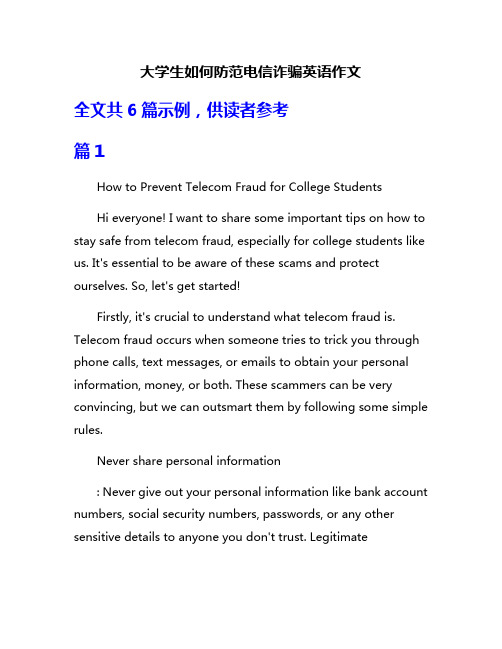
大学生如何防范电信诈骗英语作文全文共6篇示例,供读者参考篇1How to Prevent Telecom Fraud for College StudentsHi everyone! I want to share some important tips on how to stay safe from telecom fraud, especially for college students like us. It's essential to be aware of these scams and protect ourselves. So, let's get started!Firstly, it's crucial to understand what telecom fraud is. Telecom fraud occurs when someone tries to trick you through phone calls, text messages, or emails to obtain your personal information, money, or both. These scammers can be very convincing, but we can outsmart them by following some simple rules.Never share personal information: Never give out your personal information like bank account numbers, social security numbers, passwords, or any other sensitive details to anyone you don't trust. Legitimateorganizations will never ask for such information through phone calls or messages.Be cautious with unknown callers: If you receive a call from an unknown number, be careful. Don't disclose any personal information or agree to anything immediately. It's always better to verify the caller's identity by contacting the organization directly using their official contact information.Beware of suspicious messages: Be wary of text messages or emails claiming that you've won a prize, inherited money, or that there's a problem with your bank account. These are common tactics used by scammers to lure you into sharing your personal information. Always double-check the source and consult with your parents, guardians, or college authorities if you're unsure.Use strong passwords: Create strong and unique passwords for all your online accounts, including social media, email, and banking. Avoid using easily guessable passwords like your birth date or simple number combinations. Remember to change your passwords regularly and keep them confidential.Update software and apps: Regularly update the software and apps on your devices, including your smartphone, tablet, and computer. Software updates often include security patches that fix vulnerabilities that scammers may exploit.Educate yourself: Stay informed about the latest scams and fraud techniques. Follow trusted sources like government websites, law enforcement agencies, or reputable news outlets to learn about new scams and ways to protect yourself. Share this information with your friends and family to create awareness.Report suspicious activities: If you encounter any suspicious activities or believe you have been a victim of telecom fraud, report it to the authorities immediately. They can investigate the issue and take appropriate action.Remember, prevention is always better than cure. By following these tips, we can keep ourselves safe from telecom fraud and help others stay protected too. Stay alert, be cautious, and don't hesitate to seek help if you're unsure about any communication you receive.Together, we can build a safer online environment for everyone! Let's spread the word and protect ourselves from telecom fraud.Stay safe and take care!Yours,[Your Name]P.S. If you have any questions or concerns about telecom fraud, feel free to reach out to your parents, guardians, or college authorities. They will be happy to assist you!篇2How to Avoid Getting Tricked by Bad Guys on the Phone and ComputerHi there! My name is Jamie and I'm going to tell you all about how college students can stay safe from mean people who try to steal their money or information through phones and computers. It's really important to be careful because these scammers are super sneaky!First, let's talk about phone calls. Sometimes bad guys will call you pretending to be from a company or the government. They might say you owe money or there's a problem with youraccount. But don't listen to them! A real company would never ask for private info like your social security number or bank account over the phone. If someone calls demanding money or personal details, just hang up. It's a scam!Another sneaky trick is when they act like your friend or family member is in trouble and needs money right away. They'll say "This is your cousin Jamie, I got in a car accident and need 500 for repairs!" Don't fall for it! Always verify who is actually calling by contacting your real family/friends a different way. The scammers are great liars.Speaking of liars, romance scams are really common too. A nice-seeming person will start talking to you online and slowly gain your trust over weeks or months. Then one day they'll tragically need money for an emergency and beg you to send it. But it's all a lie! Never send money to someone you only know online, no matter how kind they seem.Phishing is another big problem. That's when crooks send fake emails or texts pretending to be from legitimate companies. The messages will have links to log into fake websites that look real. If you enter your username and password, the scammers can steal your info! Always double check that any login pages you visit have the proper URL for that real company.You know how when your mom or dad tries to spell words phonetically but gets them hilariously wrong? Like writing "could of" instead of "could have?" That's a good way to spot phishing emails - they're often written strangely with poor grammar and spelling mistakes. Real companies have professional emails.Oh, and one more phone scam to watch out for is when they call pretending to be computer support! They'll say there are viruses or security issues on your devices and offer to remotely access them to "fix" the fake problems. Don't let them! You'll just be giving complete control of your computer to a scammer.Let's move on to staying safe when using computers and the internet directly. Having strong, unique passwords for each account is hugely important. That way if one password is discovered, your other logins are still protected. Don't use obvious passwords either, like your pet's name or birthday.Mix it up with random letters, numbers, and symbols.Or better yet, use a password manager! This is a special app that creates and stores crazy secure passwords for you. That's what grown-ups like your parents and teachers use.Pop-up windows are another thing to be wary of. Sometimes when you're browsing the web, random popup boxes will appear saying your computer is infected or you need to call support. Justexit out of those; they're never legit and exist only to scare you. Make sure you have good anti-virus software installed to block potential viruses and malware.Social media and oversharing is one last area to be mindful of. Don't accept friend/follow requests from random people you don't actually know. Scammers will try gathering personal info and details about your life from your online profiles to make their phishing attempts seem more believable and trustworthy when contacting you.In general, just be really careful about what private information you post publicly! Things like your birthday, pet names, mom's maiden name, and favorite movies/bands may seem harmless but are common password hint questions. Give scammers less ammunition to work with.Well, I think that covers a lot of the major scams and advice! College is meant to be a fun time, not one spent being tricked and losing money. Use common sense, don't overshare personal data, and stay skeptical of any pushy demands for payment or logins over the phone/online. If something seems fishy, it absolutely is! Better to be rude and hang up on a potential scammer than be polite and get robbed blind.Let the proper authorities know if you spot any suspicious activity as well. Scammers are incredibly persistent, but knowing what red flags to watch for goes a long way in out-smarting them. Stay vigilant, trust your gut, and stay safe out there! The bad guys are crafty, but us kids are too smart to let them ruin our good times. Right? Right! Now let's go play and forget about those lousy crooks.篇3How to Prevent Telecom Fraud for College StudentsHello, everyone! Today, I want to talk to you about something very important—how to protect ourselves from telecom fraud. As college students, we need to be aware of the dangers and learn how to keep ourselves safe. Here are some tips to help us stay away from scams.First and foremost, we should always remember to be cautious and skeptical. If someone we don't know contacts us through phone calls, messages, or social media, we need to be careful. Fraudsters often pretend to be someone else, like bank employees or government officials, and try to trick us into giving them personal information. We should never share our bankaccount details, ID numbers, or passwords with anyone we don't trust.Secondly, it's essential to keep our personal information private. We should be cautious about sharing too much personal information on social media platforms or websites. Fraudsters can use our personal details to impersonate us or gain access to our accounts. Let's be smart and only share personal information with trusted sources.Another important tip is to verify the authenticity of any calls or messages we receive. If someone claims to be from a bank or company, we should independently contact the institution using official contact information to confirm if the communication is genuine. By doing so, we can avoid falling into the trap of scammers who try to manipulate us with fake identities.It's also crucial to stay updated about the latest scams and fraud techniques. We can read news articles or follow trustworthy sources to learn about the different types of fraud that are happening. Being aware of the tactics used by scammers will help us recognize and avoid them. Remember, knowledge is power!In addition, we should always be mindful when using public Wi-Fi networks. Public Wi-Fi networks can be easily hacked,allowing fraudsters to intercept our online activities and steal our information. It's better to use a secure and private network or a virtual private network (VPN) to protect our data while using the internet.Lastly, if we ever suspect that we are being targeted by a scammer, it's important to report it immediately. We can inform our parents, teachers, or the local authorities about the incident. By reporting it, we not only protect ourselves but also help prevent others from becoming victims.In conclusion, as college students, we need to be aware of the risks associated with telecom fraud and take necessary precautions to protect ourselves. By being cautious, keeping personal information private, verifying the authenticity of communications, staying updated, using secure networks, and reporting suspicious activities, we can reduce the chances of falling victim to scams. Let's stay safe and wise in the digital world!Remember, together we can fight against telecom fraud! Stay vigilant and protect yourself!Word Count: 343 words篇4How College Students Can Avoid Telecom FraudHi everyone! Today I want to talk to you about something really important - telecom fraud and how college students can avoid getting tricked by bad people. Telecom fraud is when somebody tries to steal your money or personal information over the phone, internet or through text messages. It's a really big problem and lots of students have lost money because of it.The first thing to know is that the bad guys who do telecom fraud are super sneaky. They will try all kinds of tricks to make you think they are someone they're not, like a bank employee or even the police! One common scam is when they call you pretending to be from the IRS or tax office. They say you owe a bunch of money in taxes and if you don't pay right away with gift cards or bitcoin, you'll go to jail. Scary, right? But it's just a big fat lie to try and steal your money!Another popular scam is when they pretend to be from Microsoft or an internet company. They say your computer is sending out viruses and hackers are attacking it. Then they try to get you to give them remote access so they can "fix" your computer and install virus protection. But really they are the hackers and will encrypt all your files for ransom money! Don'tever give control of your computer or install anything from callers like that.Sometimes the scammers will pretend to be from a charity asking for donations after a big disaster or emergency. They make up sob stories to try and make you feel bad so you'll send money. Other times they say you won or inherited money but have to pay fees up front to get it. Anytime someone asks you to pay fees or taxes before you get a prize or windfall, it's definitely a scam!The bad guys also love to go after students by pretending to be from the college financial aid office, student loan company or scholarship foundation. They say you qualify for grants or loan forgiveness but need to provide your bank info, social security number and other personal data to verify your identity. Don't fall for it! They just want access to steal your identity, money and ruin your credit.So how can you spot these crooks and avoid getting conned? The most important rule is never give out any personal, banking or credit card information over the phone, email or text unless YOU initiated the contact and definitely know who you are talking to. Don't trust caller ID since that can be faked easily. If it seems fishy at all, just hang up!Another top tip is to never send gift cards, bitcoin, wire transfers or money orders for any reason when someone contacts you out of the blue. Those payment methods are almost impossible to trace or reverse if it's fraud. Also be super careful about opening links or attachments from unknown numbers or addresses as they could contain malware.If you get a suspicious call or message, the safest thing is to hang up and verify it separately through an official website or source you know is legitimate. You can call back any real company or government agency through their public customer service numbers, not any numbers the caller provides.I know it can be really confusing to tell what's real and what'sa scam sometimes. But just always be super cautious, skeptical and don't let anyone rush you into making snap decisions, especially about money or personal info. Discuss any confusing contacts with your family, friends or college advisors to get a second opinion.Telecom scammers are the worst - they are mean bullies trying to take advantage of innocent people. But if we all learn to recognize their tricks and schemes, we can stop them in their tracks! Don't ever be embarrassed to report fraud attempts tothe proper authorities too. The more we can spread awareness, the better we can protect ourselves and each other.College should be an amazing, fun time for making friends, discovering your passions and preparing for a bright future career. Don't let lowlife scumbag crooks take away that experience or drain your funds through deceit. Be vigilant, be skeptical, verify everything, and enjoy your studies! Thanks for reading, stay safe out there, and scammers be gone!篇5How College Students Can Avoid Telecom FraudHi, friends! Today, I want to talk to you about something really important, especially for college students. It's called "telecom fraud", which sounds like a super serious grown-up thing, but don't worry, I'll explain it in a way that's easy to understand.You see, when you go to college, you'll have a lot of new freedoms and responsibilities. You'll be living on your own, managing your own money, and making lots of new friends. It's an exciting time, but it can also be a bit scary, especially when it comes to dealing with things like phone calls and text messages from people you don't know.Telecom fraud is when someone tries to trick you into giving them your personal information or money over the phone or through text messages. These people are called "scammers", and they can be really sneaky and convincing.Here are some examples of how telecom fraud can happen:Someone calls you and says they're from a bank or a government agency, and they need your credit card number or Social Security number to "verify your account". But really,they're just trying to steal your information!You get a text message that says you've won a free vacation or a big prize, but you have to pay a "processing fee" first. Don't fall for it! It's just a scam to get your money.Someone pretends to be a charity or a company you trust, and they ask for your bank account details or login information. They might even sound really nice and friendly, but they're just trying to steal from you.So, how can you protect yourself from telecom fraud when you're in college? Here are some tips:Never give out your personal information, like your credit card number, Social Security number, or bank account details,over the phone or through text messages. Legitimate companies and organizations won't ask for this information this way.Be really careful about clicking on links or opening attachments from unknown sources. They could contain viruses or malware that can steal your information or take over your device.If someone calls or texts you and asks for money or personal information, hang up or don't respond. Then, call the company or organization they claim to be from using a number you know is legitimate, and ask if the request was real.Set up strong passwords and two-factor authentication on your accounts, especially your email and banking accounts. This makes it much harder for scammers to hack into your accounts.Trust your gut! If something seems too good to be true or just feels "off", it's probably a scam. Don't be afraid to say no or hang up.Stay up-to-date on the latest scams and fraud tactics by checking trusted sources like the Federal Trade Commission's website or your school's security alerts.I know all of this might sound a bit scary, but don't worry! As long as you're careful and follow these tips, you'll be able toenjoy your college experience without falling victim to telecom fraud.Remember, scammers are sneaky and they're always coming up with new tricks, so it's important to stay vigilant and never let your guard down. If you're ever unsure about something, ask a trusted friend, family member, or someone at your school for help.College is an amazing time, filled with new adventures and opportunities. But it's also a time when you'll need to be responsible and protect yourself from people who might try to take advantage of you. By following these tips, you'll be able to focus on your studies, make new friends, and have the time of your life without worrying about telecom fraud.So, what do you think? Are you ready to be a smart and savvy college student who knows how to spot and avoid telecom scams? I know you've got this! Just remember to stay alert, trust your instincts, and never be afraid to ask for help if you need it.Good luck, and have fun in college! Bye for now!篇6How to Prevent Telecom Fraud for College StudentsHello everyone! I want to tell you about something very important that every college student should know about: how to prevent telecom fraud. Fraudsters are people who try to trick us into giving them our money or personal information, and we need to be smart to protect ourselves. Here are some tips to stay safe!Be cautious with unknown calls: If someone calls you claiming to be from a bank, company, or government agency, be skeptical. Don't give out any personal information or share your bank details over the phone. Remember, legitimate organizations will never ask for your password or PIN number.Beware of suspicious messages: Fraudsters often send text messages or emails that look official. They might say you won a prize, have a problem with your bank account, or need to provide personal information urgently. Be careful! Don't click on any links or download attachments from unknown sources. If in doubt, verify the message with the organization directly.Guard your personal information: Your personal information is valuable, so keep it safe. Don't share sensitive details like your ID number, bank account information, or passwords with anyone unless you are absolutely sure of their identity and trustworthiness. Be especially cautious when using public Wi-Fi networks, as they may not be secure.Verify before you trust: If someone asks for your personal information, money, or assistance, take the time to verify their identity. Contact the organization directly using official contact details to ensure the request is legitimate. Remember, it's better to be safe than sorry!Educate yourself: Stay informed about the latest scams and fraud techniques. Read news articles, follow official sources, and attend workshops or seminars on fraud prevention. The more you know, the better prepared you'll be to recognize and avoid scams.Seek help and report: If you suspect that you have been targeted or fallen victim to a telecom fraud, don't panic. Reach out to your local authorities, your bank, or the organization involved in the scam. They can provide guidance and take appropriate action.Reporting fraud helps protect others from falling into the same trap.Remember, my friends, it's important to be cautious and aware of potential fraudsters. Don't let them take advantage of you! By following these tips and staying vigilant, we can all stay safe from telecom fraud. Let's protect ourselves and help others do the same.Take care and stay safe!Yours sincerely,[Your Name]P.S. If you have any questions or want to share your own experiences, feel free to leave a comment below!。
预防网络诈骗的英语作文100字
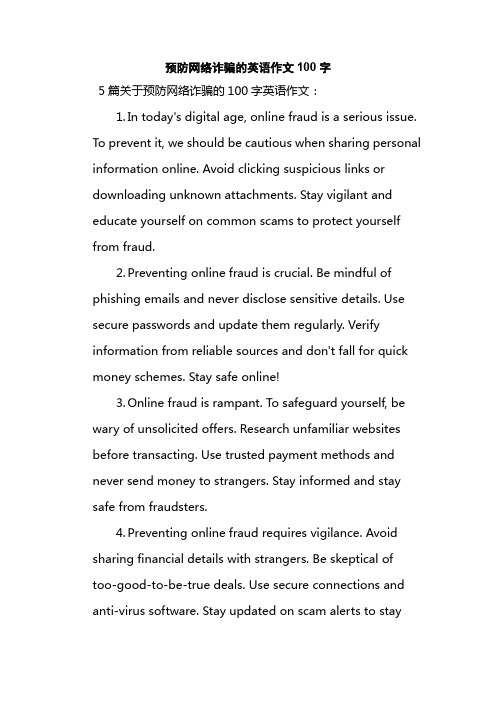
预防网络诈骗的英语作文100字5篇关于预防网络诈骗的100字英语作文:1.In today's digital age, online fraud is a serious issue. To prevent it, we should be cautious when sharing personal information online. Avoid clicking suspicious links or downloading unknown attachments. Stay vigilant and educate yourself on common scams to protect yourself from fraud.2.Preventing online fraud is crucial. Be mindful of phishing emails and never disclose sensitive details. Use secure passwords and update them regularly. Verify information from reliable sources and don't fall for quick money schemes. Stay safe online!3.Online fraud is rampant. To safeguard yourself, be wary of unsolicited offers. Research unfamiliar websites before transacting. Use trusted payment methods and never send money to strangers. Stay informed and stay safe from fraudsters.4.Preventing online fraud requires vigilance. Avoid sharing financial details with strangers. Be skeptical oftoo-good-to-be-true deals. Use secure connections and anti-virus software. Stay updated on scam alerts to staysafe online.5.Online fraud is a real threat. Guard your identity and financial information. Be careful with online transactions and never trust unverified sources. Educate yourself on fraud techniques and stay alert to avoid falling victim. Stay safe, stay vigilant!。
如何预防电信诈骗英语作文
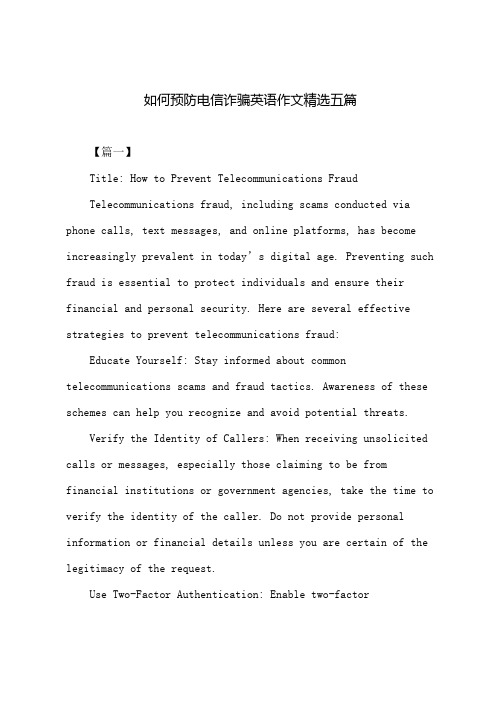
如何预防电信诈骗英语作文精选五篇【篇一】Title: How to Prevent Telecommunications FraudTelecommunications fraud, including scams conducted via phone calls, text messages, and online platforms, has become increasingly prevalent in today’s digital age. Preventing such fraud is essential to protect individuals and ensure their financial and personal security. Here are several effective strategies to prevent telecommunications fraud:Educate Yourself: Stay informed about common telecommunications scams and fraud tactics. Awareness of these schemes can help you recognize and avoid potential threats.Verify the Identity of Callers: When receiving unsolicited calls or messages, especially those claiming to be from financial institutions or government agencies, take the time to verify the identity of the caller. Do not provide personal information or financial details unless you are certain of the legitimacy of the request.Use Two-Factor Authentication: Enable two-factorauthentication for your online accounts and services to add an extra layer of security, making it more difficult for fraudsters to gain unauthorized access to your accounts.Keep Software Updated: Regularly update your computer, smartphone, and other devices with the latest security patches and anti-virus software to protect against potential vulnerabilities that could be exploited by fraudsters.Beware of Phishing Attempts: Be cautious of unsolicited emails, text messages, or pop-up windows requesting personal or financial information. Legitimate organizations will not askfor sensitive information via these channels.Secure Personal Information: Safeguard your personal information, including social security numbers, credit card details, and passwords. Be cautious of sharing such information, especially when prompted by unexpected or unverified sources.Report Suspicious Activity: If you encounter a suspected telecommunications fraud attempt, report it to the relevant authorities, such as your local law enforcement agency or the Federal Trade Commission (FTC), to help prevent others fromfalling victim to the same scam.In conclusion, preventing telecommunications fraud requires vigilance, awareness, and proactive measures to safeguard personal and financial information. By staying informed, verifying the identity of callers, and securing personal data, individuals can significantly reduce their risk of falling victim to fraudulent schemes.By embracing these preventive measures, individuals can contribute to making the telecommunications landscape safer and more secure for themselves and others.【篇二】Title: Strategies to Prevent Telecommunications FraudTelecommunications fraud has become a prevalent issue in today’s digital age, posing a threat to individuals’financial security and personal information. Preventing telecommunications fraud is crucial to safeguard oneself from potential scams and fraudulent activities. Here are some effective strategies to prevent telecommunications fraud: Stay Informed: Educate yourself about common telecommunications fraud schemes, including phishing, vishing(voice phishing), smishing (SMS phishing), and spoofing. Awareness of these tactics is key to recognizing and avoiding potential fraud.Verify Caller Identity: Be cautious when receiving unsolicited calls requesting personal or financial information. Verify the caller’s identity by asking for their name, organization, and contact details. Do not provide sensitive information unless you are certain of the legitimacy of the caller.Protect Personal Information: Safeguard your personal and financial information, such as Social Security numbers, bank account details, and passwords. Refrain from sharing sensitive information via phone, email, or text unless you initiate the contact with a trusted entity.Enable Call Blocking Features: Utilize call blocking features provided by telecommunication providers or third-party apps to filter out known scam numbers and prevent fraudulent calls from reaching you.Exercise Caution Online: Avoid clicking on suspicious links or providing personal information in response to unsolicitedemails or messages. Legitimate organizations will not request sensitive information via these means.Monitor Financial Accounts: Regularly monitor your bank and credit card statements for any unauthorized transactions or suspicious activities. Report any discrepancies to your financial institution immediately.Report Fraudulent Activity: If you suspect that you have been targeted by telecommunications fraud, report the incident to the appropriate authorities, such as the Federal Trade Commission (FTC) or your local law enforcement agency. By reporting fraudulent activity, you can help prevent others from falling victim to similar scams.In conclusion, preventing telecommunications fraud requires a combination of vigilance, awareness, and proactive measures to protect oneself from potential threats. By staying informed, verifying caller identities, protecting personal information, and promptly reporting suspicious activity, individuals can reduce their risk of falling victim to telecommunications scams.By implementing these preventive strategies, individualscan play a proactive role in safeguarding their financial security and privacy in an increasingly digital world.【篇三】Preventing Telecom FraudTelecom fraud has become a prevalent issue globally, and it is crucial for individuals to be vigilant and informed about ways to prevent falling victim to such scams. Here are sometips on how to prevent telecom fraud:Be cautious of unexpected communications: Avoid responding to unsolicited emails, messages, or phone calls asking for personal or financial information. Verify the identity of the sender or caller before sharing any sensitive details.Protect personal information: Do not disclose personal information such as passwords, PINs, or account details to unknown individuals or websites. Ensure that your online accounts are secure with strong, unique passwords.Double check before taking action: Before making any payments or providing information in response to a communication, verify the legitimacy of the request by contacting the company or organization directly using officialcontact information.Stay informed: Keep yourself updated on common telecom fraud schemes and tactics. Understanding how scammers operate can help you recognize and avoid potentially fraudulent situations.Use call blocking services: Consider using call blocking apps or services to filter out known scam numbers. This can help reduce the risk of receiving fraudulent calls.Report suspicious activities: If you suspect that you have been targeted by a telecom fraud scheme or have encountered a fraudulent communication, report it to the relevant authorities, such as your telecom provider or local law enforcement.Educate others: Spread awareness about telecom fraud prevention among your family, friends, and community. By sharing information and tips on how to stay safe, you can help protect others from falling victim to scams.By following these preventive measures and staying vigilant, individuals can reduce their risk of becoming victims of telecom fraud. Remember that being cautious and proactive iskey to safeguarding your personal information and financial security.【篇四】Preventing Telecom FraudTelecom fraud has become a pervasive problem in today’s digital age, with scammers using various tactics to deceive individuals and steal their personal information or money. To protect oneself from falling victim to telecom fraud, there are several important preventive measures that one can take.Firstly, it is crucial to be cautious of unsolicited communications. Individuals should be wary of unexpected emails, messages, or phone calls asking for personal information or financial details. It is advisable to verify the identity of the sender or caller before sharing any sensitive information.Secondly, protecting personal information is essential in preventing fraud. People should refrain from disclosing sensitive data such as passwords, PINs, or account details to unknown individuals or websites. It is important to ensure that online accounts are secured with strong passwords and thatsensitive information is not shared indiscriminately.Furthermore, individuals should exercise caution before taking any action in response to a communication that requests personal or financial information. Verifying the legitimacy of the request by contacting the relevant company or organization directly using official contact information can help preventf alling into a fraudster’s trap.Staying informed about common telecom fraud schemes and tactics is also key to prevention. By understanding how scammers operate and the methods they use to deceive individuals, people can be better equipped to recognize and avoid potential fraudulent situations.Additionally, utilizing call blocking services to filter out known scam numbers can help reduce the risk of receiving fraudulent calls. By proactively blocking suspicious numbers, individuals can minimize their exposure to potential telecom fraud attempts.In the event of encountering a suspicious communication or suspecting that one has been targeted by a telecom fraud scheme, it is important to report such activities to therelevant authorities. By reporting fraud incidents to telecom providers, law enforcement agencies, or consumer protection organizations, individuals can help combat fraudulentactivities and protect others from falling victim to similar scams.Overall, through a combination of vigilance, caution, education, and active prevention measures, individuals can significantly reduce their susceptibility to telecom fraud. By staying informed and practicing safe online behaviors, people can safeguard their personal information and financial well-being in an increasingly digital world.【篇五】Preventing Telecom FraudTelecom fraud is a growing concern in our modern society, with scammers using various tactics to exploit individuals and trick them into divulging personal information or making financial transactions. To combat this threat, it is essential for individuals to take proactive steps to protect themselves from falling victim to telecom fraud.One of the most crucial preventive measures is to beskeptical of unsolicited communications. Individuals should exercise caution when receiving unexpected emails, messages, or phone calls asking for personal or financial information. It is important to verify the authenticity of the sender or caller before sharing any sensitive details.Secondly, safeguarding personal information is paramount in preventing fraud. People should refrain from disclosing confidential data such as passwords, PINs, or banking details to unknown parties or websites. Ensuring that online accounts are secured with strong, unique passwords can help prevent unauthorized access.Furthermore, individuals should verify the legitimacy of requests for personal or financial information. Before responding to any communication that asks for sensitive data,it is advisable to confirm the validity of the request by contacting the relevant organization directly through verified channels.Staying informed about common telecom fraud schemes is also vital for prevention. By educating oneself about the tactics used by scammers and staying updated on the latest fraudtrends, individuals can better recognize and avoid potential fraudulent attempts.Utilizing call-blocking tools or services can be an effective way to fend off unwanted or suspicious calls from fraudsters. By screening out known scam numbers, individuals can reduce the likelihood of falling prey to telecom fraud.In the event of encountering a potential fraud scheme or suspecting fraudulent activity, individuals should report such incidents to the appropriate authorities, such as telecom providers, consumer protection agencies, or law enforcement. Reporting fraud helps in raising awareness, tracking criminal activities, and protecting others from falling victim to scams.In conclusion, by adopting a proactive and cautious approach, staying informed, and utilizing available resources, individuals can enhance their defenses against telecom fraud. By taking steps to safeguard personal information and maintain vigilance in their communications, people can reduce the risk of becoming victims of fraudulent schemes. Prevention is key in combating telecom fraud and protecting oneself in an increasingly digital world.。
网络欺诈 英文作文

网络欺诈英文作文I can't believe I fell for an online scam. I thought I was being smart and cautious, but I still got tricked. It's so frustrating to think that there are people out there who make a living by deceiving others.The worst part is that it's not just about losing money. It's also about feeling violated and foolish. I trusted the website and the person behind it, and now I feel like Ican't trust anyone online anymore.I wish there was a way to track down these scammers and make them pay for what they've done. It's not just about getting my money back, it's about holding them accountable for their actions.I've learned my lesson, though. From now on, I'm goingto be extra careful about where I share my personal information and who I trust online. I don't want to fallfor another scam and go through this kind of disappointmentagain.It's scary to think about how easy it is for anyone to become a victim of online fraud. I never thought it would happen to me, but now I realize that no one is immune to it. We all need to be more aware and cautious when we're on the internet.。
预防诈骗的英语作文

预防诈骗的英语作文1. Living in a digital age, we're all potential victims of scams, so it's crucial to equip ourselves with the right tools and mindset. "Scam Awareness: The First Step to Cyber Protection"2. The first line of defense? Educating ourselves. "The Power of Knowledge: Understanding Phishing Tricks"3. Don't believe everything you read, especially on social media. "Social Media Skepticism: Spotting Fake News"4. Keep personal information private, especially financial details. "The Secret to a Fraud-Free Life: Guard Your Privacy"5. Be cautious with unsolicited calls or emails. "The Call of the Unknown: Don't Answer Unsolicited Requests"6. Trust your instincts, if something seems too good tobe true, it probably is. "Trust Your Gut: When Suspicion Rings True"7. Report suspicious activities to authorities. "The Citizen's Role: Reporting to Combat Financial Fraud"8. Regularly update your security software. "TheDigital Shield: Stay Ahead of Cyber Threats"9. Stay connected with friends and family for support. "Community Connection: A Stronger Bulwark Against Scams"10. Remember, prevention is better than cure. "Prevention: The Key to Avoiding the Scam Trap"This is your chatgpt, always ready to help you navigate the digital world with诈骗 awareness. Stay vigilant, and you'll be a fraud survivor!。
网络诈骗安全英语作文
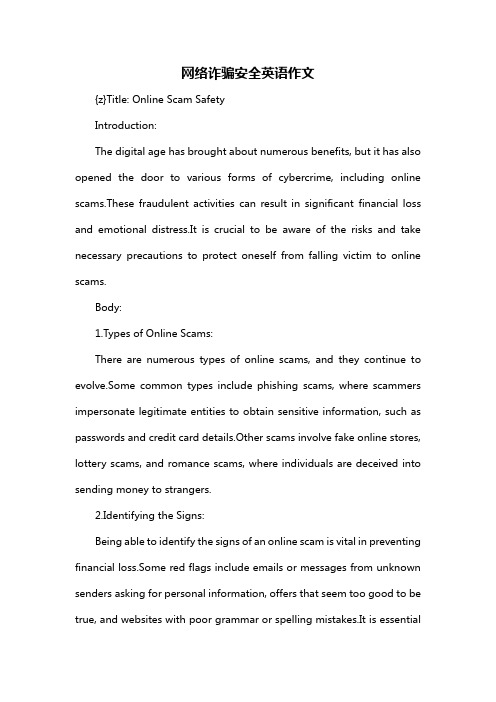
网络诈骗安全英语作文{z}Title: Online Scam SafetyIntroduction:The digital age has brought about numerous benefits, but it has also opened the door to various forms of cybercrime, including online scams.These fraudulent activities can result in significant financial loss and emotional distress.It is crucial to be aware of the risks and take necessary precautions to protect oneself from falling victim to online scams.Body:1.Types of Online Scams:There are numerous types of online scams, and they continue to evolve.Some common types include phishing scams, where scammers impersonate legitimate entities to obtain sensitive information, such as passwords and credit card details.Other scams involve fake online stores, lottery scams, and romance scams, where individuals are deceived into sending money to strangers.2.Identifying the Signs:Being able to identify the signs of an online scam is vital in preventing financial loss.Some red flags include emails or messages from unknown senders asking for personal information, offers that seem too good to be true, and websites with poor grammar or spelling mistakes.It is essentialto exercise caution when dealing with such instances.3.Protecting Yourself:To protect oneself from online scams, it is important to take several precautionary measures.Firstly, never share personal or financial information with anyone unless it is a trusted and legitimate entity.Secondly, ensure that websites are secure by looking for the padlock symbol in the browser"s address bar and checking for the "https" protocol.Additionally, installing anti-virus software and keeping browsers and devices updated can help detect and prevent scams.4.Staying Informed:Staying informed about the latest online scams and fraud techniques is crucial in maintaining cybersecurity.Regularly updating passwords, using strong and unique passwords for different accounts, and being cautious of suspicious links or attachments in emails can significantly reduce the risk of falling victim to online scams.5.Seeking Assistance:If you suspect that you have encountered an online scam, it is essential to seek assistance immediately.Contact your financial institution to block any unauthorized transactions and report the scam to the appropriate authorities, such as the police or the Federal Trade Commission (FTC).Conclusion:Online scams pose a significant threat in the digital age, and it is essential to be vigilant and take necessary precautions to protect oneself.By understanding the types of scams, identifying the signs, and implementing protective measures, individuals can reduce their risk of falling victim to online fraud.Staying informed and seeking assistance when needed are also crucial steps in maintaining cybersecurity.。
以如何安全上网远离网络诈骗英语作文

以如何安全上网远离网络诈骗英语作文全文共6篇示例,供读者参考篇1How to Surf the Web Safely and Avoid Internet ScamsHi friends! Today I want to talk to you about something really important - staying safe when you're online. The internet is an awesome place with lots of cool games, videos, and information. But there are also some not-so-cool things out there that you need to watch out for.One of the biggest dangers is internet scams. A scam is when someone tries to trick you into giving them your personal information or money. There are all kinds of different scams, but they are set up to take advantage of you. The people behind them don't care that you're just a kid - they just want to get what they want from you.So how can you spot a scam and stay safe? Here are some tips:Never give out personal informationThis one is super important. Personal information includes stuff like your full name, address, phone number, email address, passwords, or payment information like credit card numbers. Bad people can use this information to steal your identity or your money. Only share personal info with your parents or other trusted adults that you know in real life.Be careful what you clickSometimes there are links or ads that promise free games, prizes or tools if you click on them. Or they might say you're the millionth visitor and have won something. Don't fall for it! These are often tricks to get you to share information or install malware (malicious software that can damage your device). Only click on links from sources you completely trust.Check with a parent firstIf something seems too good to be true, it probably is. You see an ad for a free tablet or that you've won a big prize - check with your parents before doing anything! They can help you determine if it's legitimate or a scam trying to take advantage of you.Use safe search filtersWhen searching online, be sure to use safe search filters to avoid inappropriate content. You can enable these in your browser settings. And if you do come across something sketchy, stop what you're doing and tell a trusted adult right away.Question unexpected messagesHave you ever gotten a random message from a stranger, maybe saying they're a friend of a friend or that you've won a contest you didn't enter? These are likely scams trying to get your information. Legit companies won't contact you out of the blue like this. Delete messages like this and don't respond.Keeping your personal information safe and being cautious about what you click on or engage with are the biggest keys to staying safe online. Let's go over a couple more quick tips:Create strong passwords using letters, numbers and symbolsKeep your passwords a secret and change them regularlyBe careful what you post or share - nothing is truly private onlineDon't open emails or attachments from people you don't knowIf something seems fishy, trust your instincts and steer clearThe internet is an amazing resource, but there are some bad people out there trying to take advantage. By staying alert and being cautious, you can have fun and learn online safely.I hope these tips help you avoid getting tricked or scammed on the internet. Remember, if you're ever unsure about something, ask your parents, teacher or another trusted adult before going any further. We all need to work together to keep the internet a safe and awesome place!Stay smart and stay safe out there, friends! The world wide web is your oyster, as long as you surf those digital waves carefully. See you next time!篇2Title: Keeping Safe on the World Wide WebHi there, friends! Today, I want to talk to you about something really important – staying safe while surfing the internet. The internet is an amazing place where we can learn new things, play games, watch videos, and even talk to our friends and family who live far away. But just like in the real world, there are also dangers lurking online that we need to be careful about.Let me start by telling you about this really cool guy named Cyber Buddy. He's a superhero who protects kids like us from the bad guys on the internet. Cyber Buddy knows all the tricks that those sneaky cyber crooks use to try and trick us, and he's going to teach us how to outsmart them!One of the biggest dangers online is something called "phishing." That's when bad people send fake emails or pop-ups that look like they're from a real company or website, but they're actually trying to steal your personal information. Cyber Buddy says we should never click on links or give out our passwords or other private details unless we're 100% sure it's a legitimate website or email.Another thing Cyber Buddy warns us about is downloading stuff from sketchy websites or opening emails from people we don't know. These could contain viruses or malware that can mess up our computers or even steal our data! Only download games, apps, or files from trusted sources that your parents or teachers have approved.You know those pop-ups that promise free game codes or prizes if you enter your information? Cyber Buddy says those are almost always scams, and we should never fall for them. If something seems too good to be true, it probably is!Speaking of games, Cyber Buddy also wants us to be careful when playing online games, especially if we're chatting with other players. Never share personal details like your real name, address, or phone number with strangers online. And if someone starts saying or doing anything that makes you feel uncomfortable, log off immediately and tell a trusted adult.Another important thing Cyber Buddy teaches us is about online privacy. We should never post our home address, phone number, or other personal information on social media or public websites. It's also a good idea to use nicknames or avatars instead of our real names when playing online games or posting in forums.Cyber Buddy also reminds us to be smart about what we share online. Once something is posted on the internet, it's really hard to take it back, and it can stay there forever! We should think carefully before posting pictures, videos, or personal information, and always ask our parents or guardians for permission first.Now, I know all of this might sound a bit scary, but don't worry! As long as we follow Cyber Buddy's advice and stay alert, we can have a ton of fun and learn lots of cool stuff online while still staying safe.Remember, if you ever come across something that seems fishy or makes you feel uncomfortable, log off right away and tell a trusted adult. Together, we can outsmart those cyber crooks and make the internet a safer place for everyone!So there you have it, my friends! Stay sharp, stay safe, and keep having a blast online with the help of our pal Cyber Buddy. Happy surfing!Word count: 2002篇3Title: Navigating the Online World SafelyHello, my name is Alex, and I'm here to share some important tips on how to stay safe while exploring the exciting world of the internet. As kids, we love spending time online, playing games, watching videos, and chatting with friends. However, it's crucial to remember that the internet can also be a place where dangers lurk, and we need to be careful to avoid online scams and protect ourselves.The Internet: A Vast Playground with Hidden DangersThe internet is like a vast playground filled with endless possibilities for fun and learning. We can discover new things,play games, and connect with people from all around the world. However, just like a real playground, there are also risks and potential dangers we need to be aware of.One of the biggest dangers on the internet is online scams. These are tricks or deceptions used by bad people to try to steal our personal information, money, or even our identities. Scammers can be very clever and use various tactics to trick us into falling for their schemes.Common Online Scams to Watch Out ForPhishing Scams: These are emails, messages, or websites that pretend to be from legitimate sources like banks, companies, or even friends and family. They often try to trick us into giving up our login credentials, passwords, or personal information.Fake Offers and Giveaways: Scammers might offer tempting freebies, prizes, or discounts, but they're just trying to get our personal information or money.Malware and Viruses: Some websites or downloads can contain harmful software that can damage our devices or steal our data.Online Predators: Unfortunately, there are people on the internet who might try to take advantage of kids or engage in inappropriate behavior.Staying Safe: Tips and TricksSo, how can we stay safe while enjoying the internet? Here are some tips to keep in mind:Be Cautious with Personal InformationNever share personal information like your full name, address, phone number, or school details with strangers online. It's also important to keep your passwords and login credentials secret.Think Before You ClickBe wary of links or attachments from unknown sources, as they could contain viruses or malware. If something seems too good to be true, it probably is!Use Strong PasswordsCreate strong, unique passwords for all your accounts and change them regularly. Avoid using easily guessable information like your name or birthdate.Be Wise About What You ShareThink twice before posting personal information, pictures, or videos online. Once something is on the internet, it can be difficult to remove it completely.Talk to Trusted AdultsIf you ever feel uncomfortable or unsure about something online, don't hesitate to talk to your parents, teachers, or other trusted adults. They can help you stay safe and make wise decisions.Use Parental Controls and Safe Browsing ToolsAsk your parents or guardians to set up parental controls and safe browsing tools on your devices. These can help filter out inappropriate content and protect you from potential threats.Be Kind and RespectfulJust like in the real world, it's important to treat others with kindness and respect online. Cyberbullying and mean behavior can hurt people deeply, so always think about how your actions might affect others.The Internet: A Wonderful Resource When Used WiselyThe internet is an incredible resource for learning, exploring, and having fun. By following these safety tips and being cautious,we can enjoy all the benefits of the online world while avoiding the potential dangers and scams.Remember, the internet is a vast playground, but it's important to play safely and follow the rules. Together, we can navigate this exciting digital world and make the most of all the amazing opportunities it has to offer.Stay safe, have fun, and keep learning!篇4Title: Staying Safe in the Digital WorldHi there, friends! My name is Emma, and I'm here to share some important tips on how to stay safe while exploring the wonderful world of the internet. As kids, we love spending time online, playing games, watching videos, and chatting with our friends. But just like the real world, the internet can also have its dangers if we're not careful.The internet is a vast and exciting place, but it's kind of like a big city – there are lots of amazing things to see and do, but you also need to be aware of potential risks. Just like you wouldn't wander around a strange city alone at night, you need to be cautious when navigating the online world.One of the biggest dangers we face online is something called "cyber scams." These are tricks that bad people use to try to steal our personal information, like our names, addresses, or even our parents' credit card numbers. They might send us messages pretending to be someone else, or create fake websites that look real but are actually designed to trick us.Let me give you an example. Imagine you're playing your favorite online game, and suddenly a message pops up saying you've won a free prize! All you have to do is enter your personal information to claim it. Sounds exciting, right? But wait a minute – that message could be a scam! The bad people behind it might use your information to steal your identity or your parents' money.Another common scam is when someone pretends to be a friend or family member in trouble and asks you to send them money or personal information. Remember, if something seems too good to be true or doesn't feel quite right, it's probably a scam.So, how can we stay safe and avoid these sneaky cyber scams? Here are some tips that will help:Don't share personal information: Never give out your name, address, phone number, or any other personal details tosomeone you don't know or trust online. Even if they say they're from a game company or a website you like, it's better to be safe than sorry.Be careful with links and attachments: If you receive a message or email with a link or attachment from someone you don't know, don't click on it! These could be tricks to infect your device with viruses or steal your information.Use strong passwords: When creating accounts or logging into websites, use strong passwords that are hard to guess. A good password should be a mix of letters, numbers, and symbols, and shouldn't be something obvious like your name or birthday.Keep your software updated: Make sure the apps, games, and programs you use are always up-to-date. Software updates often include important security patches that protect you from new types of cyber threats.Tell a trusted adult: If you ever come across something online that makes you feel uncomfortable or seems suspicious, don't hesitate to tell a trusted adult like your parents, teachers, or older siblings. They can help you stay safe and report any potential scams or threats.Remember, the internet is a wonderful place filled with amazing opportunities for learning, playing, and connecting with people from all over the world. But just like the real world, we need to be smart and cautious to avoid any dangers or bad situations.By following these simple tips, you can have a great time online without worrying about cyber scams or other threats. Stay safe, stay smart, and have fun exploring the digital world!篇5Title: Staying Safe in the Digital WorldHi, friends! Today, I want to talk to you about something super important – staying safe online. The internet is an amazing place where we can learn, play games, watch videos, and even talk to our friends and family who live far away. But just like in the real world, there are also some dangers we need to be aware of when we're online.One of the biggest threats we face online is something called "internet scams." These are tricks that bad people use to try and steal your personal information, like your name, address, or even your parents' credit card numbers. They might send youemails or messages that look like they're from a real company, but they're actually just trying to trick you.Another danger is something called "cyberbullying." This is when someone is mean or hurtful to you online, maybe by sending you nasty messages or posting embarrassing things about you on social media. It's really important to remember that if someone is being a cyberbully, it's not your fault, and you shouldn't feel ashamed or afraid to tell a trusted adult.So, how can we stay safe online and avoid these dangers? Here are some tips:Be careful what you share online.Never give out personal information like your full name, address, phone number, or school name to someone you don't know or trust online. Even if someone seems really nice, they might not be who they say they are.Use strong passwords.Passwords are like secret codes that keep your online accounts safe. Make sure your passwords are long, with a mix of letters, numbers, and symbols. And never share your passwords with anyone, not even your best friend!Watch out for phishing scams.Phishing is when someone tries to trick you into giving them your personal information by pretending to be a real company or website. If you get an email or message that looks suspicious, don't click on any links or open any attachments. Instead, show it to a trusted adult.Think before you post.Before you share something online, like a photo or a comment, think about whether it's something you'd be comfortable with everyone seeing. Once you've posted something online, it can be really hard to take it back.Be kind online.Just like in real life, it's important to be kind and respectful to others when you're online. If someone is being mean or hurtful to you, don't respond or retaliate. Instead, tell a trusted adult so they can help.Use privacy settings.Most social media platforms and online games have privacy settings that let you control who can see your profile or posts. Make sure you adjust these settings to keep your information private and only share it with people you know and trust.Talk to trusted adults.If you ever feel unsafe or uncomfortable online, or if you think you might have been the victim of an internet scam or cyberbullying, it's important to tell a trusted adult right away. They can help you stay safe and figure out what to do next.The internet can be a really fun and educational place, but it's important to be smart and stay safe while you're exploring it. Remember, if something seems too good to be true or just doesn't feel right, trust your instincts and talk to a trusted adult.We all have a role to play in making the internet a safer and kinder place. By following these tips and looking out for each other, we can enjoy all the amazing things the digital world has to offer while staying safe and secure.So, what are you waiting for? Get out there and explore the online world, but always keep these safety tips in mind. Stay safe, stay smart, and have fun!篇6How to Stay Safe Online and Avoid Internet ScamsHi there! My name is Emily, and I'm a 10-year-old student. Today, I want to talk to you about something really important: staying safe online and avoiding internet scams. You see, theinternet is an amazing place where we can learn new things, play games, and talk to our friends. But it can also be a dangerous place if we're not careful.Let me start by telling you what a scam is. A scam is when someone tries to trick you into giving them your money or personal information. These bad people are called scammers, and they can be really sneaky! They might send you an email saying you've won a prize, but then they ask for your credit card number or other personal details. Or they might create a fake website that looks just like a real one, so you think it's safe to enter your information. But don't fall for it! It's just a trap to steal from you.Now, I know what you're thinking: "Emily, why would anyone want to steal from a kid like me?" Well, even though we're just kids, we still have valuable information that scammers want. Our names, addresses, and even our parents' credit card numbers are like gold to these bad people. That's why it's so important to keep our personal information safe and private.Here are some tips to help you stay safe online and avoid getting scammed:Never share personal information online.This includes your name, address, phone number, email address, or any other information that could identify you. If someone asks for this information, even if they seem nice, don't give it to them!Be careful what you click on.Scammers often send links that look real but are actually tricks to get you to download viruses or visit fake websites. If you're not sure about a link, don't click on it! Ask your parents or a trusted adult first.Don't open attachments from people you don't know.Just like with links, attachments can contain viruses or malware that can harm your computer or steal your information. Only open attachments from people you know and trust, like your family or friends.Use strong passwords and keep them secret.A strong password is one that's hard for others to guess. It should be a mix of letters, numbers, and symbols, and it shouldn't be something obvious like your name or birthday. And never share your passwords with anyone, not even your best friend!Be skeptical of amazing offers or prizes.If something sounds too good to be true, it probably is. Scammers often try to lure you in with promises of free stuff or big prizes, but it's all just a trick to get your personal information or money.Tell a trusted adult if something seems suspicious.If you ever come across something online that seems strange or makes you uncomfortable, don't try to handle it yourself. Tell your parents, a teacher, or another trusted adult right away. They can help protect you from potential scams or dangers.Use safe websites and apps.Stick to websites and apps that are well-known and trusted. Avoid clicking on pop-up ads or downloading apps from unknown sources, as these could be scams or contain malware.Be careful what you post online.Remember, anything you post online can be seen by anyone, including strangers. Don't share personal information, embarrassing photos, or anything else that could put you at risk.Keep your antivirus software up-to-date.Antivirus software helps protect your computer from viruses and malware. Make sure it's always up-to-date so it can catch the latest threats.Use privacy settings on social media.Social media can be a lot of fun, but it's important to use the privacy settings to control who can see your posts and information. That way, you can share with just your friends and family, not the whole world.Following these tips won't just keep you safe online; they'll also help protect your family and friends from potential scams or threats. Because when it comes to the internet, we all need to look out for each other!Remember, the internet is an incredible tool for learning, exploring, and having fun. But it's also a place where we need to be careful and stay alert. By following these simple rules, you can enjoy all the wonderful things the internet has to offer while avoiding the dangers and scams that are out there.So, what are you waiting for? Get out there and explore the internet, but do it safely and responsibly. And if you ever have any questions or concerns, don't hesitate to ask a trusted adultfor help. Together, we can make the internet a safer and more enjoyable place for everyone!。
3篇关于《如何防止网络诈骗》的英语六级作文
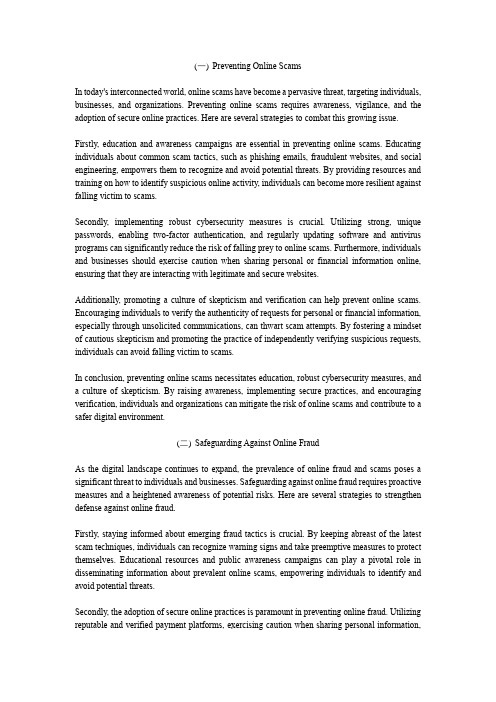
(一)Preventing Online ScamsIn today's interconnected world, online scams have become a pervasive threat, targeting individuals, businesses, and organizations. Preventing online scams requires awareness, vigilance, and the adoption of secure online practices. Here are several strategies to combat this growing issue.Firstly, education and awareness campaigns are essential in preventing online scams. Educating individuals about common scam tactics, such as phishing emails, fraudulent websites, and social engineering, empowers them to recognize and avoid potential threats. By providing resources and training on how to identify suspicious online activity, individuals can become more resilient against falling victim to scams.Secondly, implementing robust cybersecurity measures is crucial. Utilizing strong, unique passwords, enabling two-factor authentication, and regularly updating software and antivirus programs can significantly reduce the risk of falling prey to online scams. Furthermore, individuals and businesses should exercise caution when sharing personal or financial information online, ensuring that they are interacting with legitimate and secure websites.Additionally, promoting a culture of skepticism and verification can help prevent online scams. Encouraging individuals to verify the authenticity of requests for personal or financial information, especially through unsolicited communications, can thwart scam attempts. By fostering a mindset of cautious skepticism and promoting the practice of independently verifying suspicious requests, individuals can avoid falling victim to scams.In conclusion, preventing online scams necessitates education, robust cybersecurity measures, and a culture of skepticism. By raising awareness, implementing secure practices, and encouraging verification, individuals and organizations can mitigate the risk of online scams and contribute to a safer digital environment.(二)Safeguarding Against Online FraudAs the digital landscape continues to expand, the prevalence of online fraud and scams poses a significant threat to individuals and businesses. Safeguarding against online fraud requires proactive measures and a heightened awareness of potential risks. Here are several strategies to strengthen defense against online fraud.Firstly, staying informed about emerging fraud tactics is crucial. By keeping abreast of the latest scam techniques, individuals can recognize warning signs and take preemptive measures to protect themselves. Educational resources and public awareness campaigns can play a pivotal role in disseminating information about prevalent online scams, empowering individuals to identify and avoid potential threats.Secondly, the adoption of secure online practices is paramount in preventing online fraud. Utilizing reputable and verified payment platforms, exercising caution when sharing personal information,and regularly monitoring financial accounts for unauthorized activity are essential safeguards against online fraud. Additionally, individuals should be vigilant when clicking on links or opening attachments in unsolicited emails, as these are common avenues for fraudulent activities.Furthermore, creating a culture of transparency and accountability can help combat online fraud. Encouraging open communication about suspicious activities and reporting potential scams to relevant authorities fosters a collective effort to tackle online fraud. By promoting a sense of collective responsibility, individuals can collaborate to identify and address fraudulent behavior within the online community.In conclusion, safeguarding against online fraud requires awareness, secure online practices, and a culture of transparency. By staying informed, embracing secure behaviors, and fostering a community-driven approach to combat online fraud, individuals and businesses can fortify their defenses and minimize the impact of online scams.(三)Enhancing Online Fraud PreventionIn an era dominated by digital transactions and communications, the threat of online fraud looms large, necessitating heightened vigilance and proactive measures to prevent financial losses and identity theft. Enhancing online fraud prevention involves several key strategies.Firstly, promoting digital literacy and awareness is fundamental in preventing online fraud. Providing comprehensive education on recognizing and avoiding common fraud tactics, including phishing schemes, identity theft, and fake websites, empowers individuals to protect themselves. By building a strong foundation of digital literacy, individuals can make informed decisions and minimize their susceptibility to online scams.Secondly, implementing advanced security measures is crucial to deter online fraud. This includes utilizing encryption technologies, adopting secure payment platforms, and regularly updating security software to mitigate vulnerabilities. Furthermore, organizations should invest in robust authentication methods and fraud detection systems to safeguard sensitive data and transactions from unauthorized access and exploitation.Additionally, cultivating a collaborative ecosystem for fraud detection and reporting is essential. Encouraging individuals, businesses, and law enforcement agencies to share information about suspected fraud incidents and work together to identify fraudulent patterns can strengthen the collective defense against online fraud. By fostering partnerships and open channels of communication, the collective effort to combat online fraud can be significantly enhanced.In conclusion, enhancing online fraud prevention requires comprehensive education, advanced security measures, and a collaborative approach to fraud detection. By equipping individuals with digital literacy, fortifying technological defenses, and fostering a cooperative network for fraud reporting, societies can mitigate the impact of online fraud and create a safer digital environment.。
网络诈骗的英语作文150
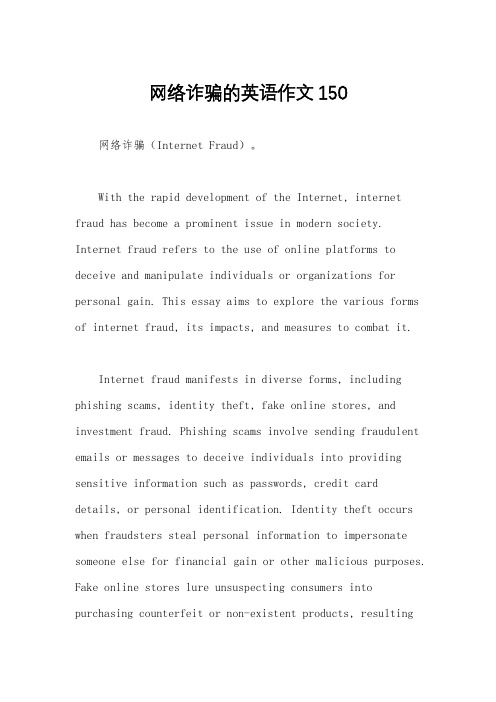
网络诈骗的英语作文150网络诈骗(Internet Fraud)。
With the rapid development of the Internet, internet fraud has become a prominent issue in modern society. Internet fraud refers to the use of online platforms to deceive and manipulate individuals or organizations for personal gain. This essay aims to explore the various forms of internet fraud, its impacts, and measures to combat it.Internet fraud manifests in diverse forms, including phishing scams, identity theft, fake online stores, and investment fraud. Phishing scams involve sending fraudulent emails or messages to deceive individuals into providing sensitive information such as passwords, credit card details, or personal identification. Identity theft occurs when fraudsters steal personal information to impersonate someone else for financial gain or other malicious purposes. Fake online stores lure unsuspecting consumers into purchasing counterfeit or non-existent products, resultingin financial losses. Investment fraud schemes promise high returns on investments but ultimately defraud investors of their money.The proliferation of internet fraud has far-reaching consequences for individuals, businesses, and society as a whole. Victims of internet fraud often suffer financial losses, emotional distress, and damage to their reputation. Businesses incur significant financial losses due to fraud-related expenses and loss of customer trust. Moreover, internet fraud undermines trust in online transactions, hindering the growth of e-commerce and digital economy.To combat internet fraud effectively, concerted efforts are required from various stakeholders, including governments, law enforcement agencies, businesses, and individuals. Governments should enact stringent laws and regulations to deter and prosecute cybercriminals. Law enforcement agencies must enhance their capabilities to investigate and apprehend perpetrators of internet fraud. Businesses should invest in robust cybersecurity measures to protect their systems and customer data from cyberthreats. Furthermore, individuals must exercise caution when sharing personal information online and remain vigilant against fraudulent schemes.In conclusion, internet fraud poses significant challenges to individuals, businesses, and society, necessitating proactive measures to address this issue. By raising awareness, strengthening cybersecurity measures, and enhancing collaboration among stakeholders, we can mitigate the impact of internet fraud and create a safer online environment for all.。
网络欺诈英文作文

网络欺诈英文作文英文:As a victim of online fraud, I can say that it was a very unpleasant experience. Last year, I received an email from what seemed to be my bank, asking me to update my personal information. Without thinking much, I clicked on the link provided in the email and entered all my details. Little did I know that it was a phishing email and I had just given away all my personal information to a scammer.A few days later, I noticed some unusual transactionsin my bank account. Someone had used my credit card to make purchases without my knowledge. I immediately contacted my bank and realized that I had fallen victim to online fraud. It was a very frustrating and stressful situation for me. Not only did I have to deal with the financial loss, but I also had to go through the hassle of reporting the fraud and getting my accounts secured.I learned my lesson the hard way. Now, I am much more cautious when it comes to sharing my personal information online. I always double-check the authenticity of theemails I receive from banks or other financial institutions.I also make sure to use strong and unique passwords for all my online accounts to prevent any unauthorized access.中文:作为网络欺诈的受害者,我可以说这是一次非常不愉快的经历。
3篇关于《如何防止网络诈骗》的英语四级作文

作文1:(总词数:160)Strategies to Prevent Online FraudPreventing online fraud requires a combination of vigilance and proactive measures. Firstly, individuals can safeguard themselves by exercising caution when sharing personal information online and refraining from disclosing sensitive details to unverified sources. Furthermore, staying informed about common online scams and being skeptical of unsolicited emails, messages, or calls requesting personal or financial information can help thwart potential fraudulent attempts. Additionally, utilizing secure payment methods and verifying the legitimacy of websites before entering sensitive data can mitigate the risk of falling victim to online fraud. Moreover, leveraging security features such as multi-factor authentication and regularly updating anti-virus and anti-malware software can bolster the protection of personal devices and data from cyber threats. By adopting these preventive strategies and maintaining a skeptical mindset towards unsolicited requests, individuals can significantly reduce the likelihood of being ensnared by online fraudsters.翻译:防止网络欺诈的策略预防网络欺诈需要警惕和积极措施相结合。
防范网络电信诈骗英语作文
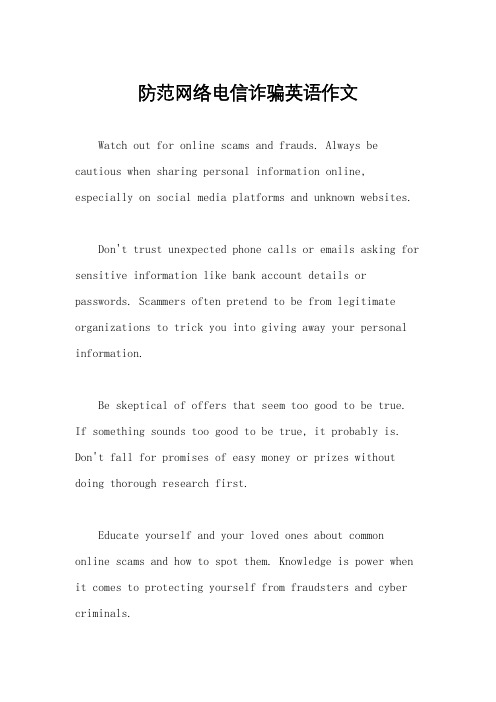
防范网络电信诈骗英语作文Watch out for online scams and frauds. Always be cautious when sharing personal information online, especially on social media platforms and unknown websites.Don't trust unexpected phone calls or emails asking for sensitive information like bank account details or passwords. Scammers often pretend to be from legitimate organizations to trick you into giving away your personal information.Be skeptical of offers that seem too good to be true. If something sounds too good to be true, it probably is. Don't fall for promises of easy money or prizes without doing thorough research first.Educate yourself and your loved ones about common online scams and how to spot them. Knowledge is power when it comes to protecting yourself from fraudsters and cyber criminals.Report any suspicious activity to the authorities or relevant organizations. By reporting scams, you can help prevent others from falling victim to the same trap.Stay up to date on the latest trends in online fraud and scams. Scammers are constantly coming up with new ways to deceive people, so it's important to stay informed and vigilant.。
安全上网,远离网络诈骗的英语作文

安全上网,远离网络诈骗的英语作文Title: Safe Internet Surfing, Stay Away from Online Scams.In today’s digital age, the Internet has become an integral part of our daily lives. While the Internet offers a wealth of information and convenience, it also poses risks, especially in terms of online scams. Therefore, it is crucial for everyone to practice safe Internet surfing to protect themselves from falling victim to scams.First and foremost, it is essential to be cautious and vigilant when sharing personal information online. Never disclose sensitive information such as passwords, credit card details, or personal identification numbers to unknown or untrustworthy sources. Scammers often use phishing emails or fake websites to deceive individuals into revealing their sensitive information, so it is important to verify the authenticity of the websites and emails before providing any personal data.Furthermore, it is advisable to use strong and unique passwords for online accounts and enabletwo-factor authentication whenever possible.Regularly update security software and keep systems and devices up to date to prevent vulnerabilities that could be exploited by cybercriminals.By following these safety measures and staying informed about common online scams, we can better protect ourselves from falling prey to cybercriminals and safeguard our personal information and financial assets. Remember, staying safe online is everyone’s responsibility.标题:安全上网,远离网络诈骗。
网络诈骗的英语作文
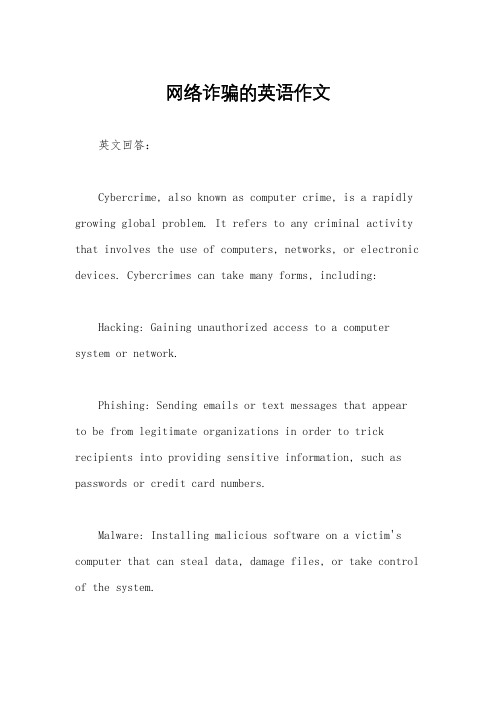
网络诈骗的英语作文英文回答:Cybercrime, also known as computer crime, is a rapidly growing global problem. It refers to any criminal activity that involves the use of computers, networks, or electronic devices. Cybercrimes can take many forms, including:Hacking: Gaining unauthorized access to a computer system or network.Phishing: Sending emails or text messages that appear to be from legitimate organizations in order to trick recipients into providing sensitive information, such as passwords or credit card numbers.Malware: Installing malicious software on a victim's computer that can steal data, damage files, or take control of the system.Identity theft: Using stolen personal information to commit fraud or other crimes.Cyberbullying: Using electronic devices to bully or harass someone.Cybercrimes can have a devastating impact on individuals, businesses, and governments. They can result in financial losses, data breaches, reputational damage, and even physical harm.Preventing and responding to cybercrimes requires a multi-faceted approach that includes:Education: Raising awareness about cybercrime threats and how to protect oneself.Technical measures: Implementing security measures, such as firewalls, anti-virus software, and strong passwords.Law enforcement: Investigating and prosecutingcybercriminals.International cooperation: Working with other countries to combat cybercrime.中文回答:网络诈骗。
关于电信诈骗作文英文
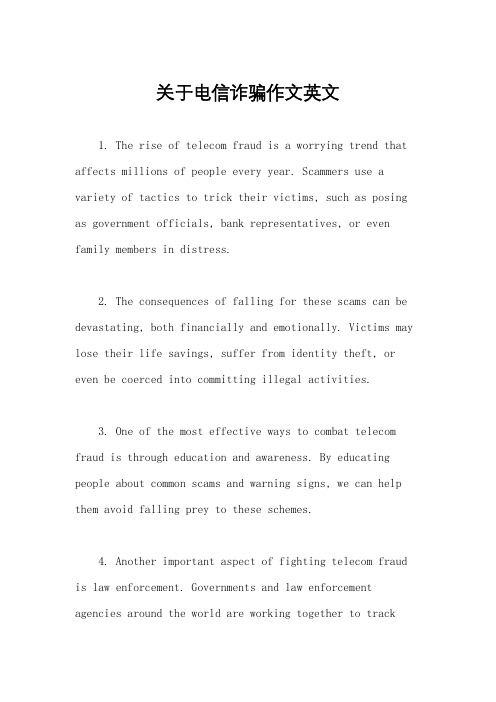
关于电信诈骗作文英文1. The rise of telecom fraud is a worrying trend that affects millions of people every year. Scammers use a variety of tactics to trick their victims, such as posing as government officials, bank representatives, or even family members in distress.2. The consequences of falling for these scams can be devastating, both financially and emotionally. Victims may lose their life savings, suffer from identity theft, or even be coerced into committing illegal activities.3. One of the most effective ways to combat telecom fraud is through education and awareness. By educating people about common scams and warning signs, we can help them avoid falling prey to these schemes.4. Another important aspect of fighting telecom fraud is law enforcement. Governments and law enforcement agencies around the world are working together to trackdown and prosecute scammers, but it can be difficult to catch them all.5. Technology can also play a role in preventing telecom fraud. Companies are developing new tools and systems to detect and block fraudulent calls and messages, but scammers are constantly evolving their tactics to stay ahead.6. Ultimately, it is up to each individual to protect themselves from telecom fraud. By being vigilant and cautious, and by never giving out personal information or sending money to unknown parties, we can help to stop these scams in their tracks.。
针对网络诈骗写一篇英语作文
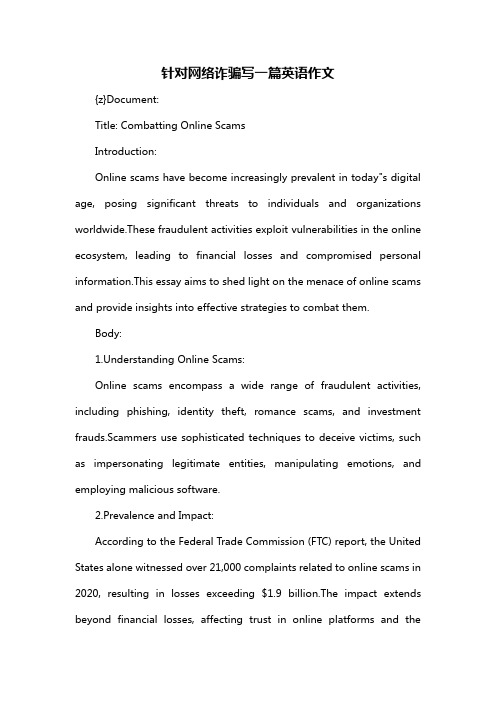
针对网络诈骗写一篇英语作文{z}Document:Title: Combatting Online ScamsIntroduction:Online scams have become increasingly prevalent in today"s digital age, posing significant threats to individuals and organizations worldwide.These fraudulent activities exploit vulnerabilities in the online ecosystem, leading to financial losses and compromised personal information.This essay aims to shed light on the menace of online scams and provide insights into effective strategies to combat them.Body:1.Understanding Online Scams:Online scams encompass a wide range of fraudulent activities, including phishing, identity theft, romance scams, and investment frauds.Scammers use sophisticated techniques to deceive victims, such as impersonating legitimate entities, manipulating emotions, and employing malicious software.2.Prevalence and Impact:According to the Federal Trade Commission (FTC) report, the United States alone witnessed over 21,000 complaints related to online scams in 2020, resulting in losses exceeding $1.9 billion.The impact extends beyond financial losses, affecting trust in online platforms and thebroader digital ecosystem.3.Preventive Measures:To combat online scams, individuals and organizations must adopt proactive measures:cation and Awareness:Promoting digital literacy and educating users about common scam techniques can empower them to identify and avoid potential threats.Workshops, online resources, and awareness campaigns can playa crucial role in this aspect.b.Strong Password Practices:Creating unique, complex passwords and regularly updating them can significantly reduce the risk of falling victim to online scams.Utilizing password managers can further enhance security.c.Two-Factor Authentication (2FA):Enabling 2FA adds an extra layer of security by requiring users to provide an additional verification method, such as a One-Time Password (OTP) or biometric authentication.d.Secure Internet Connections:Using secure and encrypted internet connections, such as Virtual Private Networks (VPNs), can protect sensitive information from being intercepted by scammers.e.Caution with Personal Information:Individuals should be cautious while sharing personal information online and avoid responding to unsolicited requests for sensitive data.4.Collaborative Efforts:Governments, law enforcement agencies, and private sector entities must collaborate to tackle online scams effectively:a.立法与执法:Strengthening legislation and enforcement actions against cybercrime can serve as a deterrent for ernments should continuously update laws to keep pace with evolving online threats.rmation Sharing:Encouraging the sharing of information and intelligence among governments, organizations, and cybersecurity firms can facilitate early detection and prevention of online scams.c.Collaboration with Tech Companies:Governments should work closely with technology companies to develop and implement advanced security measures, facilitate reporting of scams, and enhance the resilience of online platforms.Conclusion:Online scams pose a significant threat to individuals and organizations, necessitating a collective effort to combat them.Through education, preventive measures, and collaborative efforts, we can mitigate the risks associated with online scams and build a safer digitalecosystem for all.It is essential for everyone to remain vigilant and proactive in protecting themselves from the deceptive tactics employed by scammers.。
网络欺骗的伤害英语作文

网络欺骗的伤害英语作文1. Online deception can cause serious harm to individuals, both emotionally and financially. It can lead to feelings of betrayal, mistrust, and vulnerability, leaving victims with deep emotional scars that can take a long time to heal.2. The financial impact of online deception can be devastating, with victims often losing large sums of money to scammers who use deceitful tactics to trick them into handing over their hard-earned cash.3. In addition to the financial losses, victims of online deception may also experience a loss of self-esteem and confidence, as they may feel foolish for falling for the scam and may struggle to trust others in the future.4. The anonymity of the internet can make it easy for scammers to hide their true identities and avoid facing any consequences for their actions, making it difficult forvictims to seek justice or hold the perpetrators accountable.5. Online deception can also have a ripple effect, impacting not only the victims themselves but also their friends, family, and even their community, as the emotional and financial fallout spreads to those closest to them.6. It is important for individuals to be vigilant and cautious when interacting with others online, to protect themselves from falling victim to scams and deception. By staying informed and aware of the risks, people can reduce their chances of being exploited by online predators.。
网络诈骗 英语作文
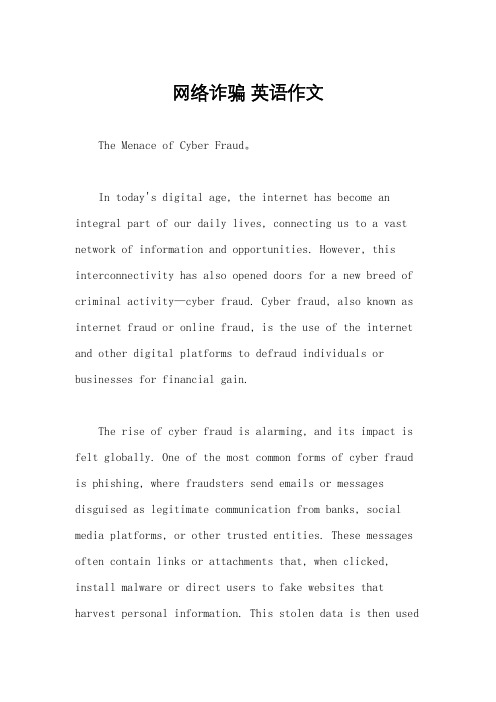
网络诈骗英语作文The Menace of Cyber Fraud。
In today's digital age, the internet has become an integral part of our daily lives, connecting us to a vast network of information and opportunities. However, this interconnectivity has also opened doors for a new breed of criminal activity—cyber fraud. Cyber fraud, also known as internet fraud or online fraud, is the use of the internet and other digital platforms to defraud individuals or businesses for financial gain.The rise of cyber fraud is alarming, and its impact is felt globally. One of the most common forms of cyber fraud is phishing, where fraudsters send emails or messages disguised as legitimate communication from banks, social media platforms, or other trusted entities. These messages often contain links or attachments that, when clicked, install malware or direct users to fake websites that harvest personal information. This stolen data is then usedto commit identity theft, credit card fraud, or other financial crimes.Another prevalent type of cyber fraud is investment scams, where fraudsters promise high returns on non-existent or fraudulent investment opportunities. They lure victims with promises of quick and easy wealth, often using sophisticated marketing techniques and fake testimonials. Once victims invest their money, they often find it。
网购被骗启示的英语作文

网购被骗启示的英语作文1. Got scammed online, what a nightmare! I thought I found a great deal on a designer handbag, but it turned out to be a cheap knockoff. Lesson learned: if it's too good to be true, it probably is.2. It's so easy to get caught up in the excitement of online shopping. With just a few clicks, you can have anything delivered to your doorstep. But beware of those fake websites that promise amazing discounts. Always do your research and read reviews before making a purchase.3. I never thought I would fall for a phishing scam, but it happened to me. I received an email from a supposedly reputable company asking for my personal information. Without thinking twice, I provided them with my credit card details. Big mistake! Always be skeptical of unsolicited emails asking for sensitive information.4. The sad truth is that scammers are getting smarterand more sophisticated. They know how to create convincing websites and emails that look legitimate. It's important to stay vigilant and double-check everything before sharing any personal or financial information.5. Another lesson I learned the hard way is to use secure payment methods when shopping online. I used a sketchy payment gateway and ended up losing my money. Stick to trusted platforms like PayPal or credit cards that offer buyer protection.6. Don't be afraid to ask for help if you suspectyou've been scammed. Contact your bank or credit card company immediately to report the fraud. They have procedures in place to assist you and prevent further damage.7. It's also crucial to educate yourself about common online scams. Stay updated on the latest tactics used by scammers so you can recognize red flags and protect yourself. Knowledge is power when it comes to online shopping.8. Finally, remember that not all online sellers are scammers. There are plenty of reputable businesses out there. Just be cautious and do your due diligence before making a purchase. Trust your instincts and if something feels off, it's better to be safe than sorry.9. Getting scammed online can be a costly andfrustrating experience. But don't let it discourage youfrom enjoying the convenience of online shopping. With the right precautions and awareness, you can shop safely and confidently in the digital world.10. In the end, the most valuable lesson I learned from being scammed is to trust myself and my instincts. If something doesn't feel right, it probably isn't. Stay alert, stay informed, and happy shopping!。
有关网络诈骗的英语作文

网络诈骗的英语作文在平日的学习、工作和生活里,大家对作文都再熟悉不过了吧,写作文是培养人们的观察力、联想力、想象力、思考力和记忆力的重要手段。
那么你有了解过作文吗?以下是小编精心整理的网络诈骗的英语作文,仅供参考,希望能够帮助到大家。
网络诈骗的英语作文篇1With the develop and the widely used of the internetshopping online is becoming a part of our life.Everything has dual charactersshopping online has advantages and disadvantages also.Advantages:People can buy anything from the internet as long as he has enough money.And you can receive the thing that you buy online at homewithout going outside.Shopping online you can have more choice.for a wordinternet shopping is convenient and fast.Disadvantages:Shopping online you could buy something that you are not satisfied with it. Beacause you cant touch the real thingjust picture.And internet shopping is unreliable we should be careful not fall into online banking fraud.随着互联网的发展和广泛应用网上购物正成为我们生活的一部分一切事物都有两面性网购也有其优缺点。
- 1、下载文档前请自行甄别文档内容的完整性,平台不提供额外的编辑、内容补充、找答案等附加服务。
- 2、"仅部分预览"的文档,不可在线预览部分如存在完整性等问题,可反馈申请退款(可完整预览的文档不适用该条件!)。
- 3、如文档侵犯您的权益,请联系客服反馈,我们会尽快为您处理(人工客服工作时间:9:00-18:30)。
有关网络诈骗的英语作文
导语:网络诈骗是指以非法占有为目的,利用互联网采用虚构事实或者隐瞒真相的方法,下面是yuwenmi小编为大家整理的优秀英语作文,欢迎阅读与借鉴,谢谢!
With the develop and the widely used of the internetshopping online is becoming a part of our has dual charactersshopping online has advantages and disadvantages also.
Advantages:People can buy anything from the internet as long as he has enough money.
And you can receive the thing that you buy online at homewithout going online you can have more a wordinternet shopping is convenient and fast.
Disadvantages:Shopping online you could buy something that you are not satisfied with it. Beacause you can't touch the real thingjust internet shop[ing is unreliable we should be careful not fall into online banking fraud.
随着互联网的发展和广泛应用网上购物正成为我们生活的一部分一切事物都有两面性网购也有其优缺点。
优点:只要他有足够的钱,人们就可以从网上买任何东西。
你可以得到的东西,你买在网上没有出去。
网上购物,你可以有更多的选择的话网上购物方便快捷。
缺点:网上购物你可以买一些你不满意的东西。
因为你不能触摸真实的东西,只是图片,网上商店[是不可靠的我们应该小心不要陷入网上银行诈骗。
更多相关文章推荐:。
